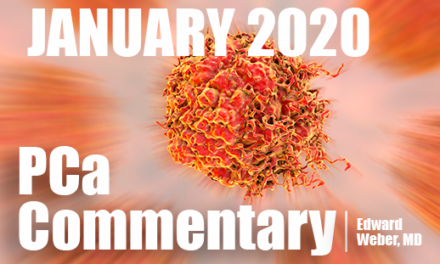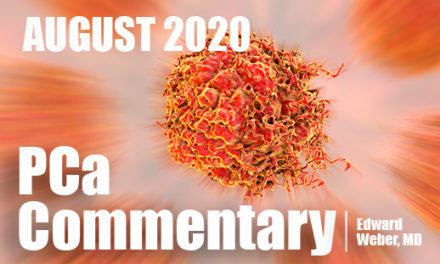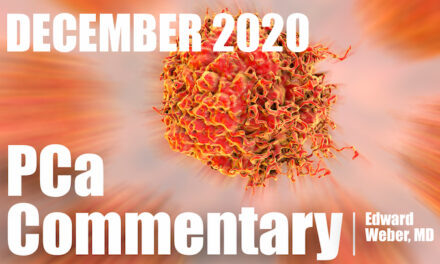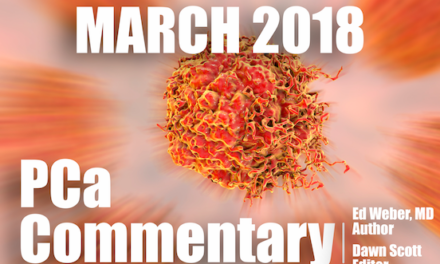
PCa Commentary | Volume 140 – November 2019
Posted by Edward Weber | November 2019
Role of Androgen Suppression Added to Salvage Radiotherapy Following Prostatectomy for High-Risk Prostate Cancer:
In Selected Cases, No Benefit and Associated Harm
Adjuvant radiation and ADT following prostatectomy for high-risk prostate cancer:
RTOG Trial 9601, Shipley et al., JCO, 2017 Jan.
The findings from this randomized Phase III trial supported the current standard of care for this situation. It compared two treatments initiated after a PSA rise to levels between 0.2 – 4.0 ng/mL after a prostatectomy and lymphadenectomy. The study involved 761 men with localized cancer having a high risk for recurrence, i.e., extracapsular extension or seminal vesicle involvement, or nodular disease with positive surgical margins. Salvage radiation to the prostate region was given to all.
Randomization specified 2 years of ADT with adjuvant bicalutamide (‘Casodex’ – 150 mg daily) for one arm and a placebo for the other. The researchers chose androgen suppression with this anti-androgen as opposed to Lupron, which is conventionally used in the US.
An important stratification allowed analysis of one group (85%) that began ‘salvage’ radiation (RT) at PSA values of <1.6 ng/mL and a second cohort which received RT at PSA between 1.6 and 4. (The current standard for commencing salvage radiation in this situation is at PSA < 0.5 ng/mL, and often well below that value.)
Findings: Actuarial overall 10-year survival was 82% for RT + ADT vs. 78% RT alone. At 12 years, death occurred in 2.3% of the RT/ADT arm vs. 7.5% for RT alone.
Conclusion: In this high-risk group, RT + 24 months of ADT after prostatectomy improved overall survival.
Of Special Note: The difference in death rate, i.e. 2.3% with ADT vs 7.5% without, would appear to strongly support the superiority of the addition of ADT. But these are overall death rate data between treatment arms.
The text of the abstract concluded with the statement, “Subgroup analysis of the relative benefits of the addition of AAT [i.e. ADT] are planned and will be presented.”
The following is the promised subgroup analysis.
Upon secondary subgroup analysis of RTOG 9601, a clinically important observation emerged: presented in “Long-term Hormone Therapy May Increase Other-Cause Mortality in Men with Prostate Cancer Receiving Early Salvage Radiotherapy.”
The study was presented in abstract form at ASTRO 2019 by Dr. Dan Spratt, Associate Professor, Radiation Oncology, University of Michigan. Dr. Spratt, along with 19 colleagues, focused on two groups stratified by pre-salvage RT PSA values, i.e. PSA of 0.2 – 1.5 vs >1.5 to 4.0 ng/mL. Some in each group had been randomized to receive ADT and others not. Of the 760 men, 85% had
pre-RT PSA values of < 1.5 ng/mL.Recognizing that androgen suppression increases cardiac adverse events, the authors focused on the rate of ‘other-cause mortality’ as an important additional observation.
Findings:
- The men in the low PSA group gained no overall survival benefit with the addition of bicalutamide. This was in contrast to the more the 50% increase in overall survival associated with ADT in the >1.5 PSA cohort.
- Men taking ADT whose pre-RT PSA was < 0.6 ng/mL experienced nearly 2X other-cause mortality compared to those taking no ADT. Those men taking ADT who started radiation at PSA values of 0.2 – 0.3 ng/mL experienced a 4X increase in other-cause mortality compared to those men not under hormone suppression. “There was also increased grade 3- 5 cardiac events in those on the bicalutamide arm (p=0.04).”
BOTTOM LINE:
- Comorbidity, especially cardiac comorbidity, needs to be considered in any treatment employing androgen suppression. The rationale for this concern is that for most men with low-risk prostate cancer, and to a lesser degree, for men with higher-risk cancer (as in this RTOG study), mortality after primary treatment is largely due to cardiac complications.
- Spratt concluded: “Pre-salvage radiotherapy PSA is both a prognostic and a true predictive biomarker for benefit of hormone therapy combined with salvage radiation.” Rationale: The PSA value following primary treatment is a surrogate for the residual burden of disease. In instances of low PSA/low tumor burden, the toxicity of ADT can outweigh its benefits.
Your comments and requests for information on a specific topic are welcome e-mail ecweber@nwlink.com.
Please also visit https://prostatecancerfree.org/prostate-cancer-news for a selection of past issues of the PCa Commentary covering a variety of topics.
“I want to thank Dawn Scott, Staffperson, Tumor Institute Radiation Oncology Group, & Mike Scully, Librarian, Swedish Medical Center for their unfailing, timely, and resourceful support of the Commentary project. Without their help this Commentary would not be possible.”
ABOUT THE AUTHOR
Edward Weber, MD, is a retired medical oncologist living in Seattle, Washington. He was born and raised in a suburb of Reading, Pennsylvania. After graduating from Princeton University in 1956 with a BA in History, Dr. Weber attended medical school at the University of Pennsylvania. His internship training took place at the University of Vermont in Burlington.
A tour of service as a Naval Flight Surgeon positioned him on Whidbey Island, Washington, and this introduction to the Pacific Northwest ultimately proved irresistible. Following naval service, he received postgraduate training in internal medicine in Philadelphia at the Pennsylvania Hospital and then pursued a fellowship in hematology and oncology at the University of Washington.
His career in medical oncology was at the Tumor Institute of the Swedish Hospital in Seattle where his practice focused largely on the treatment of patients experiencing lung, breast, colon, and genitourinary cancer and malignant lymphoma.
Toward the end of his career, he developed a particular concentration on the treatment of prostate cancer. Since retirement in 2002, he has authored the PCa Commentary, published by the Prostate Cancer Treatment Research Foundation, an analysis of new developments in the prostate cancer field with essays discussing and evaluating treatment management options in this disease. He is a regular speaker at various prostate cancer support groups around Seattle.




